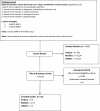Advanced practice physiotherapy in patients with musculoskeletal disorders: a systematic review
- PMID: 22716771
- PMCID: PMC3599404
- DOI: 10.1186/1471-2474-13-107
Advanced practice physiotherapy in patients with musculoskeletal disorders: a systematic review
Abstract
Background: The convergence of rising health care costs and physician shortages have made health care transformation a priority in many countries resulting in the emergence of new models of care that often involve the extension of the scope of practice for allied health professionals. Physiotherapists in advanced practice/extended scope roles have emerged as key providers in such new models, especially in settings providing services to patients with musculoskeletal disorders. However, evidence of the systematic evaluation of advance physiotherapy practice (APP) models of care is scarce. A systematic review was done to update the evaluation of physiotherapists in APP roles in the management of patients with musculoskeletal disorders.
Methods: Structured literature search was conducted in 3 databases (Medline, Cinahl and Embase) for articles published between 1980 and 2011. Included studies needed to present original quantitative data that addressed the impact or the effect of APP care. A total of 16 studies met all inclusion criteria and were included. Pairs of raters used four structured quality appraisal methodological tools depending on design of studies to analyse included studies.
Results: Included studies varied in designs and objectives and could be categorized in four areas: diagnostic agreement or accuracy compared to medical providers, treatment effectiveness, economic efficiency or patient satisfaction. There was a wide range in the quality of studies (from 25% to 93%), with only 43% of papers reaching or exceeding a score of 70% on the methodological quality rating scales. Their findings are however consistent and suggest that APP care may be as (or more) beneficial than usual care by physicians for patients with musculoskeletal disorders, in terms of diagnostic accuracy, treatment effectiveness, use of healthcare resources, economic costs and patient satisfaction.
Conclusions: The emerging evidence suggests that physiotherapists in APP roles provide equal or better usual care in comparison to physicians in terms of diagnostic accuracy, treatment effectiveness, use of healthcare resources, economic costs and patient satisfaction. There is a need for more methodologically sound studies to evaluate the effectiveness APP care.
References
-
- Trypuc J, Hudson A, MacLeod H. Ontario's wait time strategy: part 1. Healthc Q. 2006;9:44–51. 42. - PubMed
-
- Shipton D, Badley EM, Mahomed NN. Critical shortage of orthopaedic services in ontario, canada. J Bone Joint Surg Am. 2003;85-A:1710–1715. - PubMed
-
- Robarts S, Kennedy D, MacLeod AM, Findlay H, Gollish J. A framework for the development and implementation of an advanced practice role for physiotherapists that improves access and quality of care for patients. Healthc Q. 2008;11:67–75. - PubMed
-
- Ministry of Health and Long-Term Care. Health Force Ontario, New Roles in Health Care. http://www.healthforceontario.ca/WhatIsHFO/NewRoles.aspx.
-
- Bombardier C, Hawker G, Mosher D. The Impact of Arthritis in Canada: Today and Over the Next 30 Years was prepared by the Arthritis Alliance of Canada. http://www.arthritisalliance.ca/docs/20111022_2200_impact_of_arthritis.pdf.
Publication types
MeSH terms
LinkOut - more resources
Full Text Sources
Medical
Miscellaneous


